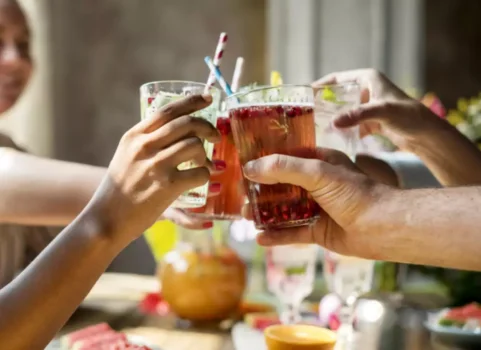
You have places, people, and events that are tied to drinking. Being around them could make it harder to stick to your plan. If that’s not possible, admit your desire to drink and don’t judge yourself for it. Call or text a friend and have your goals handy to remind yourself why you’ve dropped drinking. Tapering off alcohol can lengthen your recovery time but it may be better for you in the long run. If you have a hard time quitting alcohol then gradually reducing the amount you drink can help you on your journey to sobriety.

Lifestyle Changes That can Help
- We’re a ticking time bomb, and with each passing hour and sip of alcohol, the timer gets closer to zero.
- If you tend to drink too much whenever there is any alcohol in the house, get rid of it altogether, the NIAAA recommends.
- Cognitive Behavioral Therapy (CBT) identifies drinking triggers, while Motivational Interviewing (MI) strengthens commitment to sobriety.
- Knowing alcohol’s effects on your body can help you stop drinking.
But there’s also a risk that your loved ones won’t understand or be supportive. One of the hardest parts of sobriety is learning how to separate these things. It’s why so many people in the beginning of sobriety stay in the house and avoid going out.

Get Plenty of Sleep
Prices for visits are completely transparent and you’ll be told upfront what the cost will be based on your specific insurance. Completing 30 days without alcohol is a huge accomplishment and it’s within your reach. In 2024, 25% of US adults who regularly drink alcohol completed the Dry January challenge.
Top tips to help you quit drinking
Quitting alcohol completely can be a challenge, but there are more ways to do it than ever before. Here is our guide to giving up (or cutting back) on alcohol. If you experience DTs, such as confusion, disorientation, hallucinations, or delusions, seek medical attention immediately.
Tips for Those Trying to Stop Drinking
- If you’re ready to take control of your drinking but don’t know where to start, True Self Recovery provides a compassionate and structured approach to alcohol addiction treatment.
- Another clue that can be an indication of an unhealthy relationship with alcohol is if you make “rules” around drinking.
- While some of these changes can be uncomfortable for some time, they will eventually begin to improve the longer you abstain from alcohol use.
- If you’ve decided to stop drinking alcohol on your own, here are a few tips that may help make the process easier.
- These cutting down tips can help reduce the chances of memory loss, risky behavior, or regret.
Long-term recovery isn’t just about avoiding alcohol; it’s about creating a life you don’t want to escape from. With the right strategies, support, and self-care, you can maintain sobriety and build a future full of promise and possibility. Building a support network of family and friends is equally important. The people closest to you can offer emotional support, encouragement, and accountability, helping you stay focused on your goals. During detox, medical professionals may provide medications to help ease withdrawal symptoms and prevent serious complications. Throughout the process, they regularly check your vital signs to catch any potential concerns.
The vast majority of people who try to quit drinking alcohol will experience at least one of these. Leaving mental health problems untreated when you’re trying to quit drinking can be a recipe for relapse. If you’re reading this, chances are you have wondered about or have concerns about your drinking or that of a loved one. Heavy drinking is on the rise in the U.S. and alcohol-related problems increase with an increase in drinking. And it’s natural to have second thoughts or feel two ways about drinking when it’s having some effect on your life you don’t like. But unless you’ve really https://ecosoberhouse.com/ decided to stop drinking altogether, the first step is to increase your internal motivation to change.
Believe that you can stop drinking
Keep in mind the reasons you chose to cut back on or quit alcohol. Feeling at your best physically can boost resilience and emotional strength, equipping you to weather challenges that trigger the desire to drink. Research shows that most people believe that drinking can make them feel better. However, when alcohol makes up part of Twelve-step program your typical routine, drinking can become something of an automatic response, especially when you feel stressed or overwhelmed. Turner notes the importance of bringing along a trusted support person when attending events that involve alcohol. It’s often easier to turn down a drink when you don’t have to do it alone.

Well, you can take many paths to achieve and maintain sobriety and it’s becoming increasingly cool to be sober. The following activity offers suggestions to support you in your decision to cut back or quit drinking. It can be used with counseling or therapy and is not meant as a substitute for professional help. If you choose to try it on your own and at any point feel you need more help, then seek support (see Help Links). When you quit through tapering, you drink a little less each day until you’re able to have no alcohol at all. It can lower the severity of symptoms, and it can make you more likely to meet your goals.

If you struggle to sleep, How to Stop Drinking talk to your doctor about solutions that might help. This may be more pronounced if you often use alcohol as a way to manage existing sleep problems. Unfortunately, while alcohol may make it seem like you are falling asleep quicker, it can also lead to worse sleep quality. While giving up alcohol can be a challenge, it’s important to remember that the benefits are well worth it. You may also begin to notice a number of improvements in your physical health. You’ll have more energy and stamina, and you may notice that your skin looks healthier.


